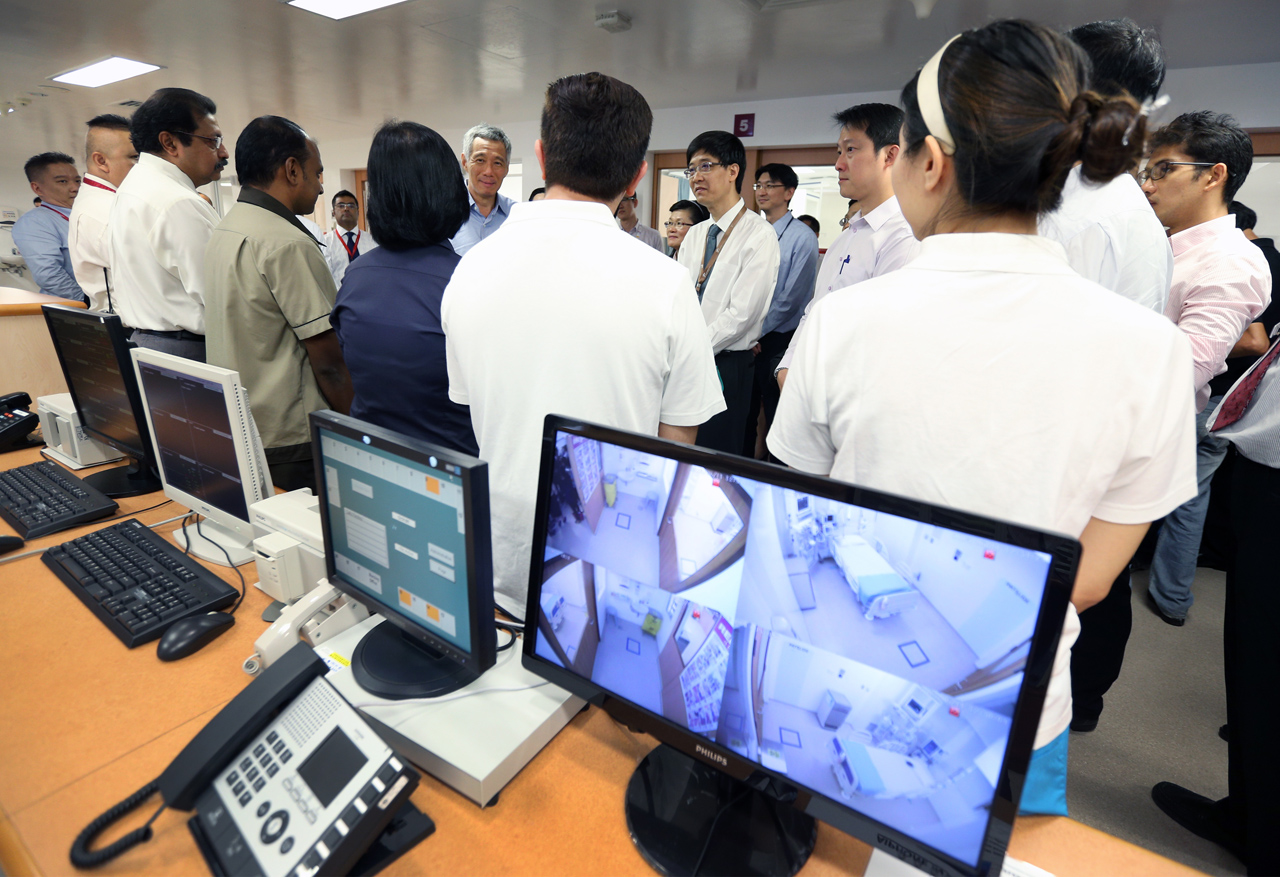Doorstop by PM Lee Hsien Loong at Tan Tock Seng Hospital on Preparedness Against Middle East Respiratory Coronavirus on 11 June 2015.
PM Lee: Well, I came this morning because I have been tracking the situation of infectious diseases which we may be confronted with – flu, all along H1N1, Ebola over the last couple of years or so in Africa. But most recently, MERS. MERS has been in the Middle East for two years. We have quite a lot of people who go to the Middle East and travel there, either for business or they go for Hajj. Every month, we have 15,000 or 20,000 visitors come back from the Middle East and MERS has been a problem there, endemic and not wiped out for quite a long time.
Most recently, we have seen an outbreak in Seoul, Korea, and it is quite a bad outbreak. With Korea, we also have very intimate exchanges. Every month, we have 40,000 travellers, including returning Singaporeans. During a holiday month like June, a lot of families go to Korea on holiday. So, I wanted to be quite sure that we were ready to deal with a case in Singapore when it comes. We must assume that it can come and will come because we are so inter-connected, because our neighbours have had cases. Malaysia has had a case; Philippines has had two cases; the European countries – many of them have had cases; America too. So for us, it’s a matter of time. And when it happens, I want to be quite sure that our medical facilities, our medical staff, the hospitals, the whole team are ready, they know how to deal with it and they don’t fumble. And we can contain it, and then put a stop to the disease in Singapore as quickly as we can.
But it is not just the medical team which has to know what to do. It is also the public, it is also the population to know what to do. If you have travelled, and when you come back and you feel unwell, you have flu symptoms, take it seriously, come to hospital and get checked. And, if it does happen, and you read it in the newspapers, not to get into panic but to know that we are prepared and what can be done and what role you ought to play. It is like what we went through when we had SARS back in 2003. I think it is what the Koreans are going through now, it is not just the disease which is the problem, but also the fear and the panic which we have to deal with. The Koreans have got 2,700 schools closed. And they have a big problem because from a medical point of view, there is not a good reason to close the schools, but the parents are all worried and what do you do? How do you get the confidence back so that you can get your schools, community and society working again? And we don’t want to get into a panic and we don’t have to if we are well prepared. So, I came to see that the medical side are well prepared, which I think they are; they gave me a good briefing, they showed me the facilities and the set up and the plans activated and how they would respond - the gear, the drills, and not just this hospital but other hospitals too. Like, if you have a pregnant woman and she has symptoms, what do you do? You have to have a protocol to bring her from KK hospital to here.
But that’s only half of it. The other half is to make sure that Singaporeans know this is a problem that can affect us. We read about it in the newspapers every day, I read about it in the newspapers every day, but the impression I would get if I were reading the newspapers is that it is still over there, not over here. And yes, the Middle East is far away; South Korea, that’s another country - we don’t want to send our children there on a school trip, in an uncertain situation. But, we have to bring it home that it could happen here and we have to be ready. So, I came here so that I can see this and also with the publicity, bring home to Singaporeans that this is something we have to worry about, which we can cope with, but we must be prepared for it.
Channel 8: 总理, 今天到访陈笃生医院, 你觉得我们做好应对中东呼吸综合症的准备了吗?
PM: 我看中东呼吸综合症(MERS)要在许多层次做准备。一个层次是我们医疗服务人员和我们医院的准备, 这个我看他们做好了。我今天到这里要了解他们的设施、安排、手续。他们给我的汇报,让我有信心,他们应该做的事已经做了。
可是要应对MERS不只是医生的问题,护士的问题,也是普罗大众的问题。所有的新加坡人都必须了解这个病症是有可能到新加坡来的。不只是其他国家,中东当然大家都知道,大家都以为中东是很遥远的地方,其实中东每个月我们有一万五千到两万个游客,从中东来。有些是新加坡人去中东旅游,或者朝圣,或者是做生意,每个月来来回回, 一万五千、两万个。
现在我们去韩国,也有MERS。韩国跟我们交往更频繁,从韩国我们每个月有四万入境人次。尤其是学校假期,很多新加坡人到韩国度假旅游, 所以完全有可能有一个MERS的病例到新加坡来。马来西亚发生过了,菲律宾发生过了,甚至香港中国也有一个人从韩国路过香港到中国,所以中国也有病例了,所以新加坡有可能吗?完全有可能。所以,我们必须有所准备,必须有心理准备。这样,万一有事情发生,我们不会措手不及,可以很平稳地去应对它。所以我今天来,一方面是鼓励我们的医生、护士、医疗人士,另一方面是给新加坡人传达一个很明确的信息,这个是我们可能有的问题,请大家注意,请大家准备好。
* * * * *
Explore recent content
Explore related topics

